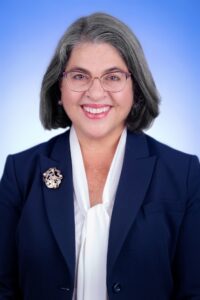By John Burr, Resilience Jax
We checked back with two Florida women who attended the recent United Nations’ COP26 conference in Glasgow, Scotland. Here’s what they said about their experience there and what they learned.
Miami-Dade County Mayor Daniella Levine Cava
She came away from the COP26 climate conference with a renewed appreciation for the importance of local government to lead the fight against the warming climate.
“I saw people from all over the world coming up with winning strategies to address climate change,” Levine Cava said. “I also really understood that so much of the action at the local level is what drives the accomplishment of those goals. It’s on us at the local level to perform.”

The first-term mayor has set an aggressive climate agenda for Miami-Dade County. She’s calling for local carbon emission reductions of 50% by 2030, and carbon zero emissions by 2050.
She said she was particularly intrigued by an idea from Japan. Local governments there are required to produce an action plan to take steps against climate change. The need for collaboration between jurisdictions across regions and statewide was also re-enforced during the discussions in Scotland.
Levine Cava said she was heartened by the young people she met at COP26.
“The young people were inspiring. I was very impressed by all their efforts to hold us to account,” she said. “I was inspired by the knowledge and sophistication that they exhibited and the commitment they brought to the conference.”
She said the biggest surprise for her was learning that the warming of the oceans has not been adequately factored into projections of climate change – meaning those projections could be off-target.
“To be told that this has not been adequately included in the projections was sobering to say the least,” she said.
Global temperature projections are at the heart of bringing climate change under control, as COP26 participants struggled to find ways to keep global temperatures from rising more than 1.5 degrees Celsius above pre-industrial age temperatures.
Looking ahead, the mayor pointed to a virtual climate conference in March 2022 that Miami-Dade County will host in collaboration with the Aspen Institute. Register at the Aspen Institute website.
Daniella Levine Cava was elected Mayor of Miami-Dade County in November 2020. A social worker, lawyer, and community activist, she was elected twice as the Miami-Dade County Commissioner representing District 8.
Julieta Rodrigo, the CLEO Institute
She went to Glasgow to tell the stories of the people she works with in Miami who suffer the effects of climate change. She was looking to speak with influential people who could make a difference.
She never got the chance, she said. Rodrigo and other activists were repeatedly denied access to the conference sessions where the decision-makers met.

“The experiences with the formal negotiation sessions were disappointing,” she said. “We were denied access again and again.”
Rodrigo was one of six delegates from the United State representing Climate Generation, and she was also representing The CLEO Institute and Miami. She was honored to be chosen and took seriously her mission to speak for the communities she represents.
Whether through mismanagement or confusion on the part of the organizers, Rodrigo said, the conference sessions often did not hear the voices of youth, women and indigenous people.
Yet there were good moments, and time for learning and sharing.
A highlight was attending a gathering of indigenous people from Canada, who were telling stories of protests against oil and gas pipelines through tribal lands, and alleged attacks on native women by the men working on the pipeline.
She also enjoyed meeting with young people from around the world and discussing the challenges they face back home, whether from pollution, forest clear-cutting, or heat waves.
Rodrigo called these informal encounters “civic engagement,” and said one reason the final COP26 reports are considered weak is that these stories from everyday people were not heard in the formal sessions.
Her message to the COP26 delegates, the people of influence, is simple: “We know you can do better and we need you to do better.”
Julieta Rodrigo until recently was a program manager for The CLEO Institute, based in Miami, where she works in education and training. She will be moving to Maryland in January to do environmental work on the Chesapeake Bay.
John Burr served on the Jacksonville Special Resiliency Committee and is a steering committee member of Resilient Jax.
“The Invading Sea” is the opinion arm of the Florida Climate Reporting Network, a collaborative of news organizations across the state focusing on the threats posed by the warming climate.



